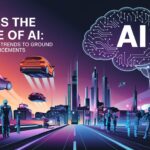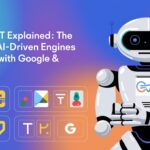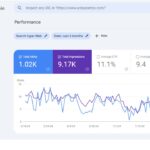What is the Future of AI? Exploring the Path Ahead
The future of AI is more than just a buzzword—it’s the gateway to a world we can barely imagine. As we stand at the crossroads of innovation, AI is poised to reshape industries, redefine human potential, and challenge our understanding of what’s possible.
What lies ahead on this journey? Will AI be our greatest ally or our biggest challenge?
In this article, we’ll explore the thrilling path ahead, uncovering the potential and pitfalls of a future driven by artificial intelligence.
Get ready to dive into the unknown and discover what the future of AI holds for us all.
The Evolution of AI: A Brief Overview
To know about the future of the AI, one need to recognize the past of the AI. The history of AI starts from the 1950s where the initial computer algorithms to replicate human intelligence were initiated.
For many decades Artificial Intelligence has been growing and has gone through the steps of recognition of simple rules and regulations to the most complex idea of machine learning which includes a good understanding of large sets of data and interpretation of these data patterns and making accurate predictions.
Some recent AI technologies include: Natural language processing, (NLP), computer vision, robots and Artificial intelligence systems.
Such technologies have already impacted industries such as the healthcare industry, financial services and manufacturing industries, and their impact is poised for further increase.
However the future of AI is far more exciting with the next stage of social evolution being held in the hands of artificial intelligence.
AI Predictions: Expectations for The Next Decade
From artificial intelligence, the next decade are expected to experience revolution transformation. Here are some key predictions for how AI will evolve and impact various aspects of our lives:
1. Advanced Natural Language Processing (NLP):
Natural Language Processing (NLP) continues to improve year by year, with AI models like ChatGPT and and BERT, it has now become possible to understand the human language and generate it as well.
In the future, NLP is expected to have a higher level and allow for more improved conversation between human and artificial intelligence.
This could potentially transform how relationships are built between customers and companies, students and tutors or between consumers and content producers making virtual assistants almost as human like.
2. Future of AI in Healthcare: Personalized Medicine and Beyond:
The future of AI in healthcare is very bright based on a concept of Personalized Medicine and Beyond.
AI can greatly help in the field of precision or personalized medicine, that is the practice of medicine taking into account to an individual’s genetic makeup, lifestyle, and medical history.
AI can potentially be applied in the development of predictive analytics which may help identify diseases early enough thus help save many lives.
Also, the idea of drug discovery through artificial intelligence is projected to intensify the current advancement in the development of new therapies leading to the delivery of treatments that save lives at a faster pace than before.
3. The Future AI in Education
Education can also be regarded as one of the Industries that will greatly benefit from current and future advancements in AI.
Use of Artificial Intelligence in education could help students to improve their learning process, as the process is customized to fit each learner’s needs.
ITSs could know what areas a learner was good at and those that a learner struggled with and then the system could support the learner adequately. Besides, incorporating AI into the classroom could help educators with tasks such as grading and record keeping, so educators would be able to spend more time with the students.
4. The Future of AI in Business
4.1 AI as a Strategic Business Tool: AI is quickly becoming an integral part of business strategy. Companies are leveraging AI to make data-driven decisions, optimize processes, and create more personalized customer experiences. In the future, AI will be essential for businesses looking to stay competitive in an increasingly digital world.
4.2 The Rise of AI-Powered Decision Making: AI algorithms can analyze vast amounts of data far quicker than humans, providing insights that were previously unimaginable. This capability will enable businesses to make more informed decisions, anticipate market trends, and respond to changes in real-time. As AI continues to develop, decision-making processes will become more streamlined and precise.
4.3 AI and Business Innovation: AI is not just about improving existing processes—it’s also about creating new business models. AI-driven innovation will lead to the development of new products, services, and even entirely new industries. Companies that embrace AI will be at the forefront of this wave of innovation, while those that lag behind may find themselves struggling to keep up.
5. The Future of AI in Marketing
5.1 Personalized Marketing at Scale: One of the most significant impacts of AI in marketing is the ability to deliver personalized content at scale. AI can analyze customer data to understand preferences, behaviors, and purchasing patterns, enabling marketers to create highly targeted campaigns. In the future, AI-driven personalization will become even more sophisticated, leading to better customer engagement and higher conversion rates.
5.2 AI and Predictive Analytics in Marketing: Predictive analytics powered by AI is already helping marketers anticipate customer needs and optimize marketing strategies. As AI technology advances, predictive analytics will become more accurate, allowing marketers to predict trends, customer responses, and the best times to launch campaigns with greater precision.
5.3 AI-Powered Content Creation: AI is also beginning to play a role in content creation. Tools like GPT-4 (yes, like me!) are capable of generating high-quality content that can be used for blogs, social media, and advertising. In the future, AI will likely take on a more significant role in creating content that resonates with specific audiences, freeing up marketers to focus on strategy and creativity.
6. The Future of AI in Customer Service
6.1 AI Chatbots and Virtual Assistants: AI-powered chatbots and virtual assistants are becoming increasingly common in customer service. These tools can handle routine inquiries, resolve issues quickly, and operate 24/7. As AI technology improves, these virtual assistants will become even more sophisticated, providing personalized support that feels more human and less robotic.
6.2 AI-Driven Customer Insights: AI can analyze customer interactions to identify pain points, preferences, and satisfaction levels. This data can be used to improve customer service strategies and ensure that businesses meet customer expectations. In the future, AI-driven insights will enable companies to proactively address issues before they escalate, improving overall customer satisfaction.
6.3 The Shift Towards Proactive Customer Service: With AI, customer service is shifting from a reactive to a proactive approach. AI can predict potential issues based on past interactions and take steps to resolve them before the customer even realizes there’s a problem. This proactive approach will lead to higher customer loyalty and a better overall experience.
7. The Future of AI in Supply Chain Management
7.1 AI and Supply Chain Optimization: AI is set to revolutionize supply chain management by optimizing every step of the process. From demand forecasting to inventory management, AI can help companies reduce costs, minimize waste, and improve efficiency. In the future, AI-powered supply chains will be more agile, responsive, and capable of adapting to disruptions.
7.2 Predictive Maintenance with AI: AI can predict when equipment is likely to fail, allowing companies to perform maintenance before a breakdown occurs. This predictive maintenance can significantly reduce downtime and extend the life of machinery, leading to cost savings and improved operational efficiency.
7.3 AI in Logistics and Distribution: AI is also transforming logistics and distribution. From route optimization to warehouse automation, AI can improve the speed and accuracy of deliveries. As e-commerce continues to grow, AI-driven logistics solutions will become even more critical for meeting customer expectations.
8. The Future of AI in Banking
8.1 AI in Fraud Detection and Prevention: AI is already being used in banking to detect and prevent fraud. AI algorithms can analyze transaction patterns to identify suspicious activity in real-time, helping to protect customers and financial institutions from fraud. As AI technology advances, these systems will become even more effective, making banking safer for everyone.
8.2 AI-Powered Personal Finance Management: AI is also making personal finance management easier. From budgeting apps to investment tools, AI can provide personalized financial advice based on an individual’s spending habits and financial goals. In the future, AI-driven personal finance tools will become even more sophisticated, helping people make smarter financial decisions.
8.3 AI in Customer Experience in Banking: Banks are increasingly using AI to enhance the customer experience. Whether it’s through AI-powered chatbots, personalized product recommendations, or streamlined loan approval processes, AI is making banking more convenient and accessible. As AI continues to evolve, these improvements will become even more pronounced, leading to a more personalized and efficient banking experience.
9. The Future of AI in Logistics
9.1 AI and Autonomous Vehicles: One of the most exciting developments in logistics is the use of AI in autonomous vehicles. Self-driving trucks and drones have the potential to revolutionize the logistics industry by reducing delivery times and costs. While this technology is still in its early stages, it’s clear that AI will play a significant role in the future of transportation.
9.2 AI-Driven Route Optimization: AI can analyze traffic patterns, weather conditions, and other factors to optimize delivery routes in real-time. This capability not only improves efficiency but also reduces fuel consumption and emissions, making logistics more sustainable. In the future, AI-driven route optimization will become standard practice, helping companies meet delivery deadlines more consistently.
9.3 The Role of AI in Warehouse Management: AI is also transforming warehouse management. From inventory tracking to robotic picking systems, AI can improve the accuracy and speed of warehouse operations. As e-commerce continues to expand, the demand for AI-driven warehouse solutions will only grow, leading to more efficient and scalable logistics operations.
10. Future of AI in Autonomous Systems: From Self-Driving Cars to AI Pilots:
Of all application areas of autonomous systems, especially in transportation, are considered to be one of most anticipated breakthroughs in AI.
Currently, tech giants are piloting self-driving automobiles on roads across the world, which will not be long before they go mainstream.
There is the probability that AI will employ more of auto-operations to other fields like flying with artificial pilots taking up commercial flights, space travel and missions with artificial pilots flying to other planets.
11. AI and the Future of Work
Some of the most common topics discussed regarding AI include its relation and effectiveness in dealing with the world’s current employment opportunities.
Cognitive computing hence threatens to eliminate several jobs although it is also anticipated to bring forth new opportunities.
As with previous innovations we can fail to see the future importance of AI and thus new industries and job positions are to emerge unknown to us today.
However, it will be somewhat challenging since this warrants a change in culture, skills development, and education of the workforce in the world of work.
12. Ethical AI: Managing the Concerns
With the advancement of Artificial Intelligence Societal issues will be a central part in shaping this field.
Some of the concerns that must be discussed include; how bias in the model poses problems for Data Scientists, how privacy rights can be violated by an AI system, and how AI can be utilized to do evil.
The future of AI is expected to come with major checks and policies in place that are aimed towards making sure that AI is created and utilized properly.
This will mean cooperation between governments, technology front runners and ethical boards to come up with a framework that can enhance innovation although protecting the individual.
13. Future of AI in Creative Industries
AI will progressively have a huge influence on creative sectors such as arts, musical and entertainment industry.
AI art and music are already emerging and the next possible trend in this area is an interaction between artificial intelligence agents and human performers who are artists.
In the entertainment industry, AI can work towards making entertainment products unique to the user’s preferences, for instance in movies, music or games and ultimately the entertainment products will be far more valuable to the customer.
14. AI and Environmental Sustainability
Options of AI in the future also include the solution to some of the biggest environmental problems in the world.
AI can be employed for energy management to reduce wastage while at the same time managing the available resources. In the agricultural sector for instance, such systems hold potential of producing higher yields and with less harm to the natural environment.
In addition, the situation can be amended because AI will be able to participate in climate modeling — defining the impact of global warming more accurately.
15. Future of AI Cyber Security
Due to progressive artificial intelligence technology, it becomes as effective tool to guard against cybercrimes as it is to launch one.
Cyber security systems that are developed with the help of artificial intelligence can recognize the threat and counter it more quickly than the manual process; thus, they are extremely useful to protect data.
Still, the same mechanisms of artificial intelligence can be utilized by wrong-doers for crafting more elaborate threats. The future is likely to witness a cat and mouse game that will be played between cybersecurity and Artificial Intelligence.
16. Human-AI Collaboration: The New Frontier of AI
The full potential of Artificial Intelligence has placing in on improving human performance rather than replacing human labour.
There is a vision that technology and especially artificial intelligence will be implementing most of the processes and human beings will be directing their efforts to higher levels of reasoning, creativity, etc.
This could create new and higher levels of production and entrepreneurship that are exemplified by the possibility of artificial intelligence being a tool which enhances human capabilities.
The Future of AI: A Global Perspective
AI’s impact will not be limited to a single country or region; it will be felt globally. Different countries are taking varied approaches to AI development, each with its own set of priorities and challenges.
AI Leadership: The Global Race.
Countries like the United States and China are currently leading the race in AI development and investing heavily in research and innovation.
The European Union is also making great progress, emphasizing on ethical AI and data protection.
In the future, more countries will likely invest in AI, creating a more competitive world. This competition could lead to new ideas but might also cause worries about AI being used in global conflicts.
AI and Developing Nations
Indeed, the developed countries are leading the world and harnessing the capability of AI technology for better efficiency, but the developing countries are in a position to benefit greatly in terms of AI’s potential.
When it comes to such problem as poverty, which may be observed in these regions, or the problem of access to healthcare or quality education, an active use of AI may be highly beneficial.
Nevertheless, there are some difficulties and the most crucial one is the digital gap that exists at the present moment as well as the question of infrastructure for the AI usage.
The continued development of AI in the developing countries will therefore rely on partnerships and funding.
AI Governance: Crafting the Rules of the Future
As AI technology spreads more widely, the need for rules to manage it becomes more important. International organizations might need to create new guidelines to handle the global effects of AI, including ethical standards and trade rules.
The future of AI regulation will need a careful balance between encouraging new ideas and keeping the world safe.
Conclusion
The future of AI in business, marketing, customer service, supply chain, banking, and logistics is incredibly promising. As AI continues to evolve, it will drive innovation, efficiency, and customer satisfaction across these sectors. Businesses that embrace AI today will be better positioned to thrive in the future, while those that hesitate may find themselves left behind. The key to success will be understanding how to integrate AI into existing processes, leveraging its capabilities to create new opportunities, and staying ahead of the competition in an increasingly AI-driven world.
FAQs
1. How can businesses start integrating AI into their operations?
Businesses can start by identifying areas where AI can add the most value, such as customer service, marketing, or supply chain management. From there, they can explore AI tools and solutions that align with their goals and gradually implement them into their processes.
2. What are the risks associated with AI in business?
While AI offers many benefits, it also comes with risks such as data privacy concerns, potential job displacement, and the need for significant upfront investment. Businesses must weigh these risks against the potential rewards and develop strategies to mitigate them.
3. How will AI change the role of human workers?
AI will likely automate many routine tasks, freeing up human workers to focus on more complex and creative work. This shift will require workers to develop new skills and adapt to new roles, but it also presents an opportunity for personal and professional growth.
4. What industries will be most affected by AI?
While AI will impact virtually every industry, sectors like finance, healthcare, retail, manufacturing, and logistics are likely to see the most significant changes due to their reliance on data and automation.
5. What is the future of AI regulation?
As AI becomes more prevalent, governments and regulatory bodies are likely to introduce new laws and guidelines to ensure that AI is used ethically and responsibly. Businesses will need to stay informed about these regulations to ensure compliance and avoid potential legal issues.










